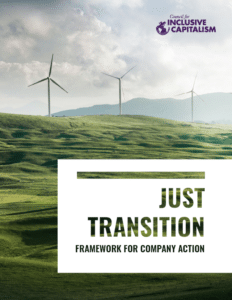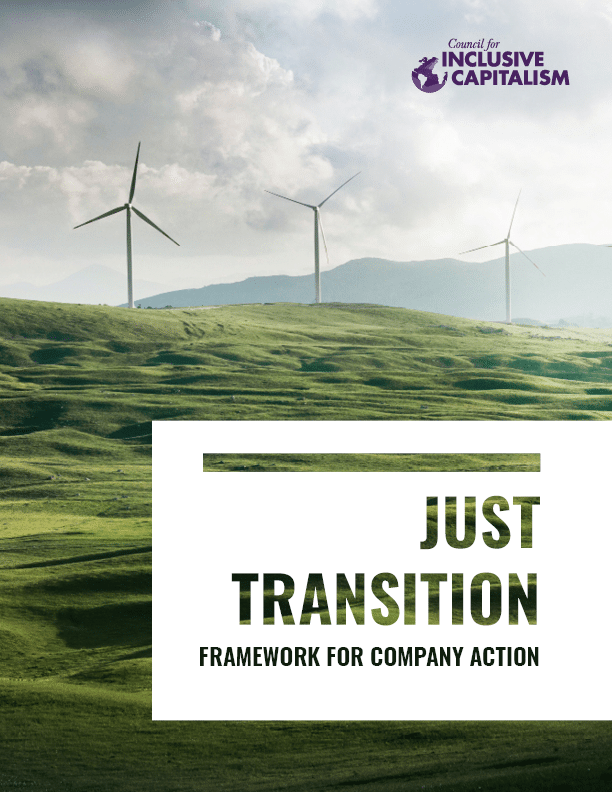Achieving a Just Transition:
Framework for Company Action
ReSources to Support Action
Click the buttons below to find resources to aid your planning of actions in line with those outlined in the Framework for Company Action. We also provide a general category of resources that apply across Framework pillars.
General resources
The Just Transition Planning Process for Business
The process of designing and implementing a just, equitable and inclusive approach to net zero is complex and requires difficult trade-offs. This guidance report from BSR offers practical steps to help companies formulate a just transition plan, including implementation tools for:
- External stakeholder engagement and social dialogue,
- Internal knowledge-gathering and discussions, and
- A company-wide integration strategy.
"Toward a Just Transition in Agriculture: Preliminary Insights"
WBCSD, the Council for Inclusive Capitalism, and PwC have come together to promote a shared understanding of what a just transition looks like in practice. This article from WBCSD's Food & Agriculture Pathway presents case studies developed in consultation with WBCSD member companies and partners operating in the agriculture sector.
Introduction to Just Transition: A Business Brief by UN Global Compact
Created in collaboration with the UN Global Compact Think Lab on Just Transition, this business brief provides an introduction to the role of business in supporting a just transition and lays out a vision to ensure the move to net-zero emissions and climate resilience is orderly, inclusive and just.
Financing a Just Transition: A Business Brief by UN Global Compact
This Business Brief addresses the roles of finance in advancing a just transition. It draws from recent developments to illustrate what is possible, while calling on key financial actors to develop and realize this potential, including financial institutions, the Chief Financial Officers and finance functions of corporations, investors, Chief Investment Officers, Chief Risk Officers and policymakers.
Achieving a just transition in the energy system
Explore a compilation of insights and case studies to support energy companies in their efforts to advance a just transition to a net-zero carbon energy system. This report highlights key insights and practices from leading WBCSD members from across the energy system and presents a series of real-world case studies from leading companies.
"Just Transition: Measuring progress" report by SSE
Following continuous engagement with a wide range of stakeholders, SSE sets out to demonstrate the impact its 20 principles for a just transition have had across its business activities, which specifically aim to promote a smooth, fair and just transition to net zero by disclosing progress against its Just Transition Strategy.
Just Nature: How finance can support a just transition at the interface of action on climate and biodiversity
This report by the Grantham Research Institute on Climate Change and the Environment defines a ‘just nature transition’ as a shift to a net zero and climate-resilient economy that delivers decent work, social inclusion and the eradication of poverty while simultaneously delivering biodiversity goals.
Just Transition Finance: Pathways for Banking and Insurance
Developed by UNEP Finance Initiative and the International Labor Organisation (ILO) with support from more than 40 banks and insurance companies, international financial institutions, academic and civil society organisations, this report gives practical recommendations and examples of emerging practices on how to embed just transition considerations in financial products and business operations.

Universal net-zero energy
Science-based Targets Initiative (SBTi)
Provides companies with a clearly-defined path to meeting the goals of the Paris Climate Agreement in line with the latest recommendations from climate science. Receive detailed feedback on your planned actions and support from the SBTi's technical experts.
Climate Action 100+ Net Zero Company Benchmark
The Benchmark assesses company performance against three high-level goals: emissions reduction, governance, and disclosure. Their assessment framework contains a specific indicator for just energy transition actions.
United Nations Race to Zero Campaign
Race To Zero is a global campaign to rally leadership for a healthy, resilient, zero carbon recovery that prevents future threats, creates decent jobs, and unlocks inclusive, sustainable growth.
International Maritime Organization's Initial Strategy on the Reduction of Greenhouse Gas Emissions
Offers a roadmap to reducing GHG emissions from international shipping and to phasing them out as soon as possible. View IMO's next steps to delivering their plan.
We Mean Business Coalition
Through its partners and collaborators, We Mean Business Coalition brings forward quality climate initiatives across a variety of systems: finance, agriculture, energy, and more.

Workforce Evolution
"Just Transition: A Business Guide"
by The B Team
This guidance contains operational advice and tactics, several case studies and analysis of the risks and opportunities of climate action on a company’s workforce. It provides ways for companies to engage with workers, unions and governments that are constructive to a clean energy economy that benefits all.
"Guidelines for a Just Transition" by the International Labour Organization (ILO)
These Guidelines are both a policy framework and a practical tool to help countries at all levels of development manage the transition to low-carbon economies. Included are mechanisms for social dialogue among governments, workers, and employers' organizations throughout policy
Building the Net Zero Energy Workforce Report
We need people with the talent, drive, and passion to help us tackle climate change. This report from National Grid identifies the skills and expertise the energy sector will need to cultivate to help the UK reach its emissions target – and the lessons are applicable globally.
"The Implications of the Transition to Net Zero Emissions for the Engineering Construction Industry" by ECITB
Commissioned by the Engineering Construction Industry Training Board, this report highlights skill gaps that must be filled to deploy at scale the technologies needed to decarbonize the industrial and energy sectors
The Green Jobs Advantage: How Climate-Friendly Investments are Better Job Creators
Analysis from the World Resources Institute, ITUC, and the Global Commission on the Economy and Climate finds
that green investments generally create more jobs
per US$1 million than unsustainable investments. Report offers comparison of near-term job effects in energy generation and transportation sectors and recommendations for replicating success.
Skills Development and Inclusivity for Clean Energy Transitions
The report reviews more than 150 case studies from over 50 countries, illustrating how best to overcome a broad range of challenges and create successful employment policies. The analysed schemes cover the reskilling of coal workers; the retraining of workers in the oil and gas sector and the auto industry; academic and corporate programmes; and targeted skills programmes for youth, women, and marginalised communities.

Community Resilience
"Practices for Just, Sustainable and Equitable Development of Clean Energy" by Ceres
This report outlines five best practices for embracing local stakeholders’ needs for local jobs, economic benefits and protection of environmental habitats.
Recommendations of the IEA Global Commission on People-Centerd Clean Energy Transitions
12 actionable recommendations for clean energy policy and programming draw on recent experiences and best practices from around the world.
Case Studies: Four Initiatives for Community Resilience in Canada
How can communities enhance long-term resilience in light of the shifting energy landscape? View the results of four initiatives incubated by Alberta-based coalition Energy Future Lab:
- Blockchain to Transact Carbon Offsets from Aggregated Micro-Solar Pilot
- Energy Efficiency Program for Small Rural Businesses Pilot
- SouthWest Alberta Experiential Learning Lab (SWELL) Concept
- Louis Bull Renewable Schools Pilot
"Business and Climate Justice: Putting People at the Heart of Climate Action"
Developed by Business Fights Poverty, this framework explores the meaning of climate justice in practice and the actions that business can take to improve lives, livelihoods, and learning.

Collaboration and Transparency
Transition Plan Taskforce (TPT) Disclosure Framework
Transition planning, and transition plans, are becoming important considerations for central banks, supervisors, standard setting bodies, and other international organizations. This framework sets out good practice for robust and credible transition plan disclosures, and is designed to be consistent with and build on the final Climate-Related Disclosures standard (IFRS S211) issued by the International Sustainability Standards Board (ISSB).
"Making the Future" - second Just Transition Commission: initial report
Scotland’s second Just Transition Commission convened in early 2022 to provide scrutiny and advice on the Scottish Government’s sectoral and regional just transition plans. This initial report sets out strategic priorities to ensure the decarbonization of Scotland's economy is delivered fairly, with lessons applicable for everyone taking an active part in helping shape a just transition.
"From the Grand to the Granular: Translating Just Transition Ambitions into Investor Action"
Investors can play a significant role in the Just energy Transition by making sure that the social dimension is fully integrated into their assessment, stewardship, capital allocation, and policy activities. This report presents a seven-point framework focusing on: strategy, workers, supply chain, communities, consumers, policy and disclosure.
World Benchmarking Alliance: Climate and Energy Benchmark
WBA's Climate and Energy Benchmark covers rankings of 450 of the world’s most influential, keystone companies in high-emitting sectors like automotive, electric utilities, oil and gas, transport, buildings and construction. As an accountability mechanism, they highlight industries and companies that are leading the way and form an evidence base to hold laggards to account.
"Real People, Real Change: Strategies for Just Energy Transitions" by IISD and GSI
This guidance for governments in both developed and developing nations provides political and communications strategies for a just transition, building on research and case studies of past and current national energy transitions.
Recommendations of the EITI for Transparency in Transition
The Extractive Industries Transparency Initiative (EITI) implements the global standard to promote the open and accountable management of oil, gas, and mineral resources. This paper focuses on the strategic direction of EITI and its implementing countries. Its findings may also help inform debate as governments and their development partners seek to support a recovery in line with a ‘well below 2°C’ world.


